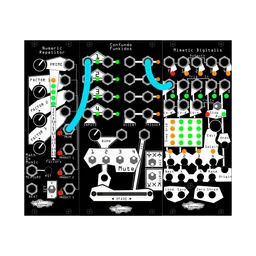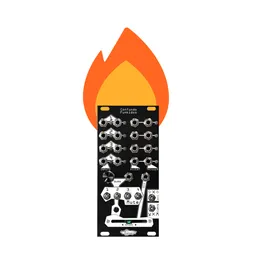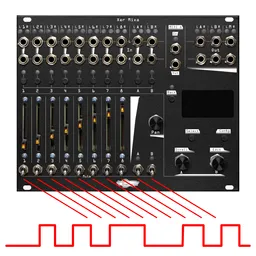One of the most common questions we get (through LinkedIn, in person, and through the website) is how to get started in making modules. This week, Stephen and Kris talk through some of their thoughts on what helped them, what didn’t, and general background that may be of use. Other manufacturers: do you have thoughts? Drop us a line and we’ll add it in!
We get questions in lots of different categories, so we’re going to organize our answers around those, with very oversimplified questions so we can abstract answers more easily. Keep in mind, your mileage may vary, and these are just our opinions. Please feel free to ask other developers what they think, too! There are lots of perspectives on these things.
Category 1: I’m a student, what classes should I take? Or: what should I learn?
We temper these answers always with what do you want to be when you grow up? But realistically, if you’re writing to us, we hope that you’ve looked at what we do enough to have reason to write...and we assume that you’re interested in the fact that we do both analog and digital work.
If you are interested in strictly analog stuff, take your circuits courses, sure, and some math. But definitely jump to category 2.
If you’re interested in firmware/programming/digital, then Stephen has a lot to say here.
The single most useful skill for embedded development in our world is C/C++ fluency. Becoming a truly proficient programmer takes a lot of time. Usually far more time than in a typical college degree. That said, other companies are making cool things other ways. Open source things exist. Look around — there are many ways to do things and there’s nothing that says our way is the only (or better) way.

Don’t be surprised if you graduate and get your ass handed to you in your first job because you don’t know as much as you thought you did. Any good employer will expect that of someone coming straight out of school. Both embedded software and DSP optimization require a very low level knowledge of the hardware so understanding assembly and the inner workings of microcontrollers is another must.
Digital Signal Processing is another useful knowledge base for developing audio software. It can be extremely math heavy particularly in the way it is traditionally taught in engineering school. If you want to teach yourself, texts for these classes are cheap if you look for older editions (Kris can rant about the march to release new editions with minor tweaks just to keep the prices up. In most cases, old editions are just fine!). These books are universally heavy on theory and light on application but provide a good foundation in the relevant theories. Another really good reference particularly for audio applications are the Julius O. Smith III books. They are unlike most other DSP books as they are intentionally written to avoid calculus and are filled with application knowledge specific to audio software.
Learn some analog hardware, even if you’re interested in the DSP side of things. Classic analog circuits inform a lot of DSP.
Finally, if you want to be in the music industry, make sure you have some music background...but specifically background in both music AND the market you’re trying to get into. Your products will only be as good as the choices you make in your code/circuits. These will be informed by the knowledge base you have. If you don’t know how people in a market segment expect things to perform, then how can you expect to make the right decisions for your products?
Category 2: What experience should I have?

As much practical experience as possible! Dabble. Pick a project, set a goal, and dive in. There are so many easy ways to dive in. Build something. Make mistakes. Learn from them. There are loads of options, including just breadboarding some circuits and trying them out! Breadboarding with throughhole parts can be efficient and really inexpensive (and also annoying and frustrating). When we proto new circuits, we often just superglue things to pieces of wood and wire it up that way. It’s a handy way to learn, and to get really familiar with your designs.
If you’re in an engineering program, you probably have an internship or co-op semester(s): try to find something that will give you hands-on experience in something that interests you and you can walk away with tangible experience that you can talk about intelligently. Consider any education you are getting simply training for whatever you want to do next and tailor it toward that. A dream internship may not be achievable, but at least try to choose something that will allow you to master an important skill.
If you’re in a Comp Sci program, write a fun app in your spare time that challenges you to do something you haven’t done before. Or write firmware for one of the SOMs out there. We love the Daisy because there is a whole ecosystem around it and a lot of users and support for it (our reverb module is based on it!), but there are loads of other options.
Category 3: How did you get started?

Stephen built a prototype on a dare once upon a time. That prototype was many things: a welcome tactile distraction from long hours at a software-only position, just some nerdy fun, a chance for him to get back to things like writing in assembly, because why not?, and our first product, the Ataraxic Translatron. (We still have a few of these early prototypes sitting around, all glued to pieces of wood). Understand: we were extremely lucky in a lot of ways to be able to be doing this full time; in fact it was a few years before we even considered it an option.
Stephen got started building stuff as a kid -- he’s programmed pretty much his whole life and was doing electronics in junior high. In high school, he built a tv just for fun. He’s that kind of guy. His degree is in math. Lest you be intimidated, though, Kris started this with literally zero background knowledge. Ok, she remembers being really interested in electronics as a kid, when her older brother had a lot of weird circuit stuff sitting around...but got distracted by frogs and snakes. She took (and loved) physics in college, which had some circuits, she thinks. It was long ago. She has a lot of degrees, but none of them are even vaguely relevant to what she does now, except that science degrees, no matter what they are, teach you how to learn things, in her opinion. So when she quit being a professor and started being the hardware person at NE, she learned this 100% by doing it, but at least felt like she had a foundation.

We now have awesome employees, too, including a junior software engineer. Ankoor went to college for engineering and knew he wanted to work in music tech. He had a strong and varied musical background, too. Ankoor is also great at being flexible, and willing to work on whatever needs to be done, and to learn new skills to get it done.
We’ve talked to a lot of other manufacturers, and it seems like being self-taught is pretty common. Don’t be intimidated or frustrated if that’s the route you take. You’ll be in good company.
Category 4: What kind of training should I get?
You’re asking people with a masters in video games and a MS and PhD in biology what training you should get? Perhaps you should reassess.
We kid, we kid. But the reality is that we have no idea, Typically we suggest people consider whether they are more partial to circuit design or programming. Most people who contact us have a pretty definite answer to that.
We’ve already said that the two really inform each other, so from our perspective, at a minimum, it would be good to have some understanding of each thing, even if you specialize in a different area. But If you are interested in working in the music industry and want to develop tools for musicians, it may not be necessary to be a master of both hardware and software. Lots of great products are strictly analog. Lots of cool companies need software engineers. There’s room for both!
Category 5: How do you get things made?
Whoa there. There are a lot of steps between wanting to make a module and going to production. And there are a LOT of things to consider. We have been fortunate to have manufacturing partners every step of the way who have helped us immensely. We wouldn’t be here today without them.
But let’s talk about the way things work. You have a concept. You breadboard out the circuitry and you’re pretty happy with it. You think it works. How do you make a PCB that you can actually build? You’ll need a CAD program.
There are several out there that are free so the barrier to entry is low: but don’t think that will mean that they are a snap to use. Expect to spend a reasonable amount of time learning them. Alternatively, some groups offer contract PCB design, and they will design your prototype and production modules for you, though you will pay for this. There are pros and cons to each method, and you should weigh them for your situation if you are here (if you have an idea but don’t want to make the engineering part happen, or you do the software and hardware is not your deal at all, for example).
From there, you have a PCB...but how do you build it? There’s a great DIY market in Eurorack. Do you want to offer kits? Only kits? Do you want to build the modules yourself? Keep in mind that handbuilding inventory quickly becomes difficult at scale. Contract manufacturers exist -- but at a cost. For us, the cost has always been worth it, but again, everyone’s path is different.
Category 6: How do I get front panels?

Oh boy. Here’s a tough one.
A lot of newer companies will go with PCB panels. They are durable enough and can look great (check out Winterbloom and omiindustriies for examples of great looking panels). They are easy to come by and less expensive than aluminum.
Aluminum is harder to get. Contract manufacturers have increasingly moved toward making aluminum panels available for products they build, but printing is a big question, and color is another. Panel art is a whole other question that you’ll need to sort out, but a good CAD program will spit out the basic format you need to know where the holes are on the panel. Just remember to leave room for the nuts around the jacks, screws, pots...not that we’ve ever made that mistake...
Category 7: How do I know how many people will want my product?
If you figure this out, will you tell us please?
The best predictor of future behavior is past behavior. Except when it isn’t. And except when you have no past data, right? If you’re new, how many do you build? There’s no magic number but our advice is to start small. If you sell those and have recouped your losses and can afford to make more, see if that is what you want to do!
Category 8: The synth maker-space seems pretty dominated by white men. I am not a white man. Is there room for me?
YES and YES.
As in yes, white men tend to be in the spotlight in modular and in synthmaking in general. But YES YES YES there is room for you. There is increasing diversity. Noise Eng is 50% woman-owned, as is 1010. And others, like Winterbloom and omiindustriies are women-owned. BboyTech recently formed the company Modbap Modular, making this, to our knowledge, the first Black-owned modular synth company, just to name a few of our pals. And there is a movement to really spotlight diverse makers and performers, so please, join us!
Category 9: Can I intern with you?
Unfortunately, no, we don’t have the capacity to take interns. We’re too small to be able to devote the time to you that we think you deserve. Kris used to be a professor and values the education experience too much to do it a disservice of taking on a student who we will lock away in a closet and not have them learn something actually useful / develop real skills.
What did we miss? Drop us a line and we’ll keep adding to this post!






